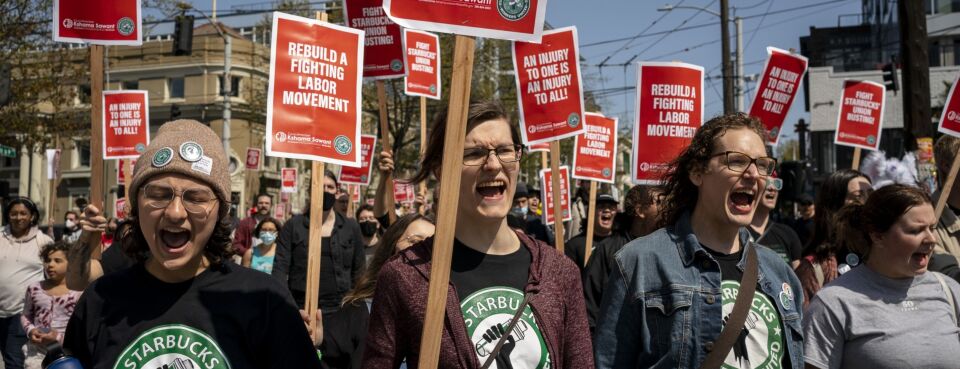
Julio Colby is a student at Harvard Law School.
In Today’s News & Commentary: The Sixth Circuit upholds an injunction compelling the rehiring of the “Memphis 7;” and a revived case about the use of preferred pronouns may offer the first test of the Supreme Court’s new standard for religious workplace accommodations.
On Tuesday, the Sixth Circuit upheld a federal judge’s injunction compelling Starbucks to rehire five of seven pro-union workers fired at a Memphis, Tennessee store, agreeing that the firings had a high likelihood of chilling organizing activity. The February 2022 firing of the so-called “Memphis 7” — 5 members of the store’s six-person organizing committee and two outspoken union supporters — was an early chapter in Starbucks’ “dirty war” against unions. Last summer, a district court judge found that the store’s organizing drive was at risk of irreparable harm without the rehiring of the workers. In affirming the judge’s finding, the panel noted the “actual evidence of the chill” resulting from the company’s anti-union campaign: testimony in the record showed that workers at the Memphis store stopped wearing union pins and discussing union matters after the firing; workers at a Jackson, Tennessee store were hesitant to organize after Starbucks posted a notice at their store detailing the discharges in Memphis; and a manager at a Florida store suggested to workers that unionization “would lead to a response from Starbucks similar to the one in Memphis.” As such, the panel reasoned, a temporary injunction was necessary “to preserve the status quo pending completion of the board’s proceedings.” The workers were rehired last fall, after the store ultimately voted to unionize by an 11-3 vote in June 2022. Starbucks maintains that the evidence was insufficient to support injunctive relief and said the company is “exploring all options for further legal review.”
A recently revived case in Indiana over the use of preferred pronouns may offer the first test of the Supreme Court’s new standard for religious accommodations in the workplace. John Kluge, a schoolteacher in Indiana, sued Brownsburg Community School Corporation for discrimination after it rescinded a religious accommodation allowing him to refer to students exclusively by their last names. Kluge brought suit under Title VII, which requires an employer to accommodate religious practices unless doing so would pose an “undue hardship.” He lost his case under previous Supreme Court precedent in Trans World Airlines v. Hardison, which had been interpreted as defining “undue hardship” to mean more than a “de minimis” cost. But in a unanimous opinion in June of this year, the Supreme Court “clarified” in Groff v. DeJoy that the de minimis test was incorrect; the Court instead stated that the correct reading of the “undue burden” test under Hardison is whether the accommodation places a “substantial burden” on the employer, based on a “fact-bound” inquiry. A Seventh Circuit panel had affirmed the district court’s ruling in favor of Brownsburg but vacated its decision last month in light of the Supreme Court’s ruling. The case now heads back to the district court to apply the new “substantial burden” test under Groff, but attorneys say the Court’s opinion did not give clear guidance to lower courts on when an accommodation constitutes a “substantial burden,” leading some to believe the question may find itself before the Supreme Court again. (Check out Andrew’s discussion of how the Court’s opinion in Groff leaves the door open for a lower court to allow religiously observant workers to override union contracts.)






Daily News & Commentary
Start your day with our roundup of the latest labor developments. See all
January 20
In today’s news and commentary, SEIU advocates for a wealth tax, the DOL gets a budget increase, and the NLRB struggles with its workforce. The SEIU United Healthcare Workers West is advancing a California ballot initiative to impose a one-time 5% tax on personal wealth above $1 billion, aiming to raise funds for the state’s […]
January 19
Department of Education pauses wage garnishment; Valero Energy announces layoffs; Labor Department wins back wages for healthcare workers.
January 18
Met Museum workers unionize; a new report reveals a $0.76 average tip for gig workers in NYC; and U.S. workers receive the smallest share of capital since 1947.
January 16
The NLRB publishes its first decision since regaining a quorum; Minneapolis labor unions call for a general strike in response to the ICE killing of Renee Good; federal workers rally in DC to show support for the Protecting America’s Workforce Act.
January 15
New investigation into the Secretary of Labor; New Jersey bill to protect child content creators; NIOSH reinstates hundreds of employees.
January 14
The Supreme Court will not review its opt-in test in ADEA cases in an age discrimination and federal wage law violation case; the Fifth Circuit rules that a jury will determine whether Enterprise Products unfairly terminated a Black truck driver; and an employee at Berry Global Inc. will receive a trial after being fired for requesting medical leave for a disability-related injury.